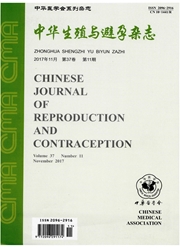

 中文摘要:
中文摘要:
目的:探讨严重少弱畸形精子尤其是不活动及畸形精子对卵胞质内单精子注射(ICSI)治疗结局的影响。方法:回顾性分析ICSI病例,选择同一患者累积治疗周期中因各种原因既使用夫精又使用供精的58例患者,其中每例患者的夫精部分(严重少弱畸形精子)列入A组和供精部分(正常精子)列入B组,比较A、B组的受精率、卵裂率、优质胚胎率、临床妊娠率及流产率的差异。结果:B组的受精率、卵裂率、优质胚胎率、临床妊娠率均高于A组,流产率低于A组,其中优质胚胎率、临床妊娠率A、B组间差异均有统计学意义(P〈0.05)。结论:严重少弱畸形精子,尤其是不活动和畸形精子行ICSI治疗的优质胚胎率和临床妊娠率均明显下降,同时还增加流产及出生缺陷的风险。
 英文摘要:
英文摘要:
Objective: To investigate the effect of extremely severe oligozoospermia and/or asthenozoospermia and/or teratozoospermia(OAT) sperm on the outcome of intracytoplasmic sperm injection(ICSI). Methods: ICSI cycles were analyzed retrospectively, 56 cases using sperms of different origins(husband and donate) were divided into group A(husband sperm) and group B(donate sperm). The fertilization rate, cleavage rate,high-quality embryo rate, clinical pregnancy rate and miscarriage rate between the two groups were compared.Results: Compared with group A, the patients in group B had higher fertilization rate, cleavage rate, goodquality embryo rate, clinical pregnancy rate, and lower miscarrige rate. Statistical differences were observed in the good-quality embryo rate and clinical pregnancy rate between the two groups(P〈0.05).Conclusion: OAT sperm especially inactivity or malformation sperms can affect outcomes of ICSI, adding the risk of miscarriage and offspring malformation.
 同期刊论文项目
同期刊论文项目
 同项目期刊论文
同项目期刊论文
 期刊信息
期刊信息
